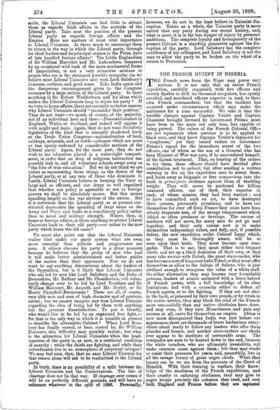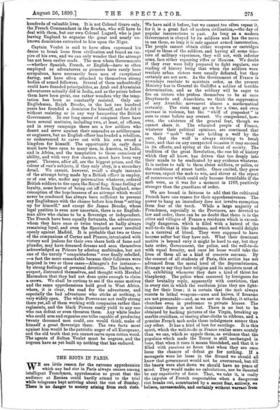THE FRENCH MUTINY IN NIGERIA. T HE French news from the
Niger may prove very serious. It is not only that an entire French expedition, carefully organised, with five officers and twenty Spahis to drill its thousand irregulars, has openly revolted, and murdered officers superior iu rank to their own French commandant, but that the incident has occurred under circumstances which may make the mutineers for a time successful. We take it that the terrible charges against Captain Voulet and Captain Chanoine brought forward by Lieutenant Peteau must have been in the main not only true, but capable of being proved. The rulers of the French Colonial Office are not squeamish when coercion is to be applied to black men, and they knew Captain Voulet's character for " roughness," yet they issued orders on Lieutenant Peteau's report for the immediate arrest of the two officers, one of whom as the son of a General who has been Minister of War was sure, if he surrendered himself, of the fairest treatment. That, on hearing of the orders to try them, these officers should have decided after consultation not to submit, but after sending a written warning to fire on the expedition sent to arrest them, and burst away as brigands or free companions into the bush is prisuilacie evidence against them of startling weight. They will never be pardoned for killing unarmed officers, one of them their superior in rank, of whose mission they had been warned ; and to have committed such an act, to have destroyed their careers, previously promising, and to have cut themselves for ever off from France they must have been utterly desperate men, of the savage temperament which Africa so often produces or develops. The excuse of madness will not serve, for many men do not go mad together, and their only course now is to make themselves independent rulers, and defy, and, if possible defeat, the new expedition under Colonel Lamy which, as they must be thoroughly aware, will be at once upon their heels. They must become open rene- gades. That is to say, they must either turn brigand chiefs and set up a black dominion of their own, or they must take service with Rabah, the great slave-raider, who has become a sort of king nearLake Tchad, or they must offer themselves as allies to the Sultan of Sokoto, who is just civilised enough to recognise the value of a white staff. On either alternative they may become very formidable persons, leaders of armies animated with a fierce hatred of French power, with a full knowledge of its close limitations, and with a, necessity either to defeat all French agents, or to die fighting. If they are not shot in the back, or poisoned by their own people, or by rivals in the native service, they may block the road of the French wore successfully than any native chieftains have done, and may even, if they turn Mussulmans and gain any success at all, carve for themselves an empire. Africa is now more disorganised than India was Just before our appearance, there are thousands of brave barbarians every- where about ready to follow any leaders who offer them plunder and licence, and neither slave-raiders nor chiefs ever appear to be destitute of serviceable arms. The renegades are sure to be hunted down in the end, because the white invaders, who are ultimately irresistible, will make common cause against them ; but they may evade or resist their pursuers for years, and, meanwhile, live in all the savage luxury of great negro chiefs. What that luxury can be we see from the accounts of the Court of Menelek. With their training in warfare, their know- ledge of the smallness of the French expeditions, and their cruelty in enforcing obedience, they may give to negro troops precisely the cohesion they need, and cost both England and France before they are captured hundreds of valuable lives. It is not Colonel Grave only, the French Commandant in the Soudan, who will have to deal with them, but our own Colonel Lugard, who is just leaving England to organise the great and nearly un- known dominions entrusted to him upon the Niger.
Captain Voulet is said to have often expressed his desire to break loose from civilisation and found an em- pire of his own, and we can only wonder that the attempt has not been earlier made. The men whom Governments —whether Spanish, French, or English—have so often employed as adventurers or pioneers have rarely been scrupulous, have necessarily been men of exceptional daring, and have often attached to themselves strong bodies of armed followers. Several of them undoubtedly could have founded principalities, as Arab and Abyssinian adventurers actually did in India, and as the prizes before them have been great, one rather wonders why the temp- tation has been so constantly resisted. Only one Englishman, Rajah Brooke, in the last two hundred years has founded a dominion for himself, and be did it without resisting or in any way hampering the British Government. In our long career of conquest there have been several mutinies, including two, at least, of officers, and in every campaign there are a few soldiers who desert and serve against their comrades as artillerymen or engineers, but no English officer has headed a rebellion, or endeavoured to carve out with his own sword a kingdom for himself. The opportunity in early days must have been open to many men, in America, in India, and in Africa, and the temptation to those conscious of ability, and with very few chances, must have been very great. Thrones, after all, are the biggest prizes, and the colour of one's subjects, if they only obey, is a secondary detail. We cannot, however, recall a single instance of the attempt being made by a British officer in employ, or of one who, under any provocation whatever, ordered British soldiers to fire upon the Royal flag. Some feeling of loyalty, some horror of being cut off from England, some conception of the hopelessness of an attempt which would never be condoned has always been sufficient to prevent any Englishman with the chance before him from" setting up for himself," and except Sir James Brooke, whose legal position is even now uncertain, there is no English- man alive who claims to be a Sovereign or independent. The French have been equally fortunate, the adventurers whom they have once or twice treated so badly always remaining loyal, and even the Spaniards never revolted openly against Madrid. It is probable that two or three of the companions of Cortez and Pizarro, intoxicated with victory and jealous for their own share both of fame and plunder, may have dreamed dreams and seen themselves acknowledged as Princes by adoring multitudes, but not one of the unruly " conquistadores " ever finally rebelled, —a fact the more remarkable because their followers were inspired in two or three cases—Almagro's for instance— by strong feelings of personal devotion. The leaders, we suspect, distrusted themselves, and thought with Marshal Macmahon that they had not done quite enough to claim a crown. We shall be curious to see if the same motives and the same apprehensions hold good in West Africa, where, it is clear, the road for the adventurer, and especially the bad adventurer who sticks at nothing, is very widely open. The white Powers are not really strong there yet, all of them working with companies rather than regiments, and the black Powers easily yield to any one who can defeat or even threaten them. Any white leader who could arm and organise one tribe capable of producing twenty thousand men could, one would think, make of himself a great Sovereign there. The two facts most against him would be the patriotic anger of all Europeans, and the old truth that you cannot carve upon rotten wood. The agents of Sultan Voulet must be negroes, and the negroes have as yet built up nothing that has endured.



































 Previous page
Previous page